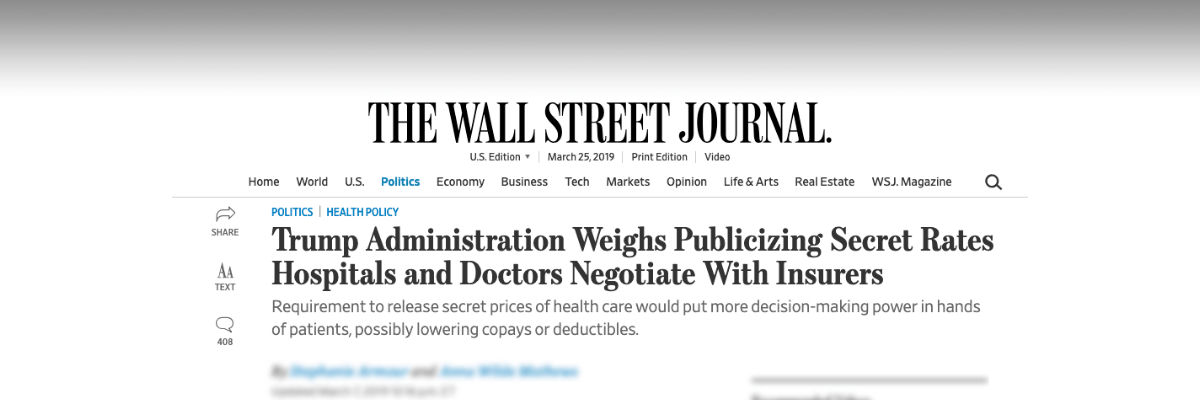Over the past week, Broken Healthcare has received an unusually large number of new subscribers. When we looked at why, we learned it’s because Discovery Communications, which owns stations in 26 television markets, ran a story with myself and Jamesia Schutt, the first patient that Broken Healthcare helped outside of my own circle of friends and family (and her saga continues to this day).
It’s important that we raise Americans’ awareness of predatory medical billing practices and the utter economic dysfunction of our healthcare system. But it’s even more important to get Americans involved in the solutions. Awareness is not enough. The mission of Broken Healthcare is to help Americans understand why our healthcare system is failing and to encourage every American to get personally involved in the solution.
A Difficult Truth
Just this week, the American Journal of Public Health released a summary of an academic report that will appear in its next print issue. This report is about the pharmaceutical industry’s support of patient advocacy groups. While this report is welcome and long overdue, I don’t imagine it will make its point the way I will: The pharmaceutical industry (and the hospital and health insurance industries) are buying off patient advocacy groups.
While pushing for legislation and a Colorado ballot measure in 2018, I learned this lesson all too well. While enjoying nearly universal support from private citizens, it was next to impossible to gain the support of patient advocacy groups (all of whom are enjoying tax-exempt status).
Why is it so hard to engage these groups? Because their funding comes from the very industries they must face when advocating for patients. Hospitals provide funding to advocacy groups under the guise of being helpful. They suggest that someone must advocate for patients, so they contribute to these local groups.
In turn, the groups advocate for individual patients, but they will never take strong positions about the issues that create the need for their advocacy in the first place, as that would threaten their funding and the funding of those who run them (Broken Healthcare doesn’t have this problem—all involved are unpaid volunteers).
Circular Logic
While there are many good nonprofit organizations in the United States, there are many more that do not deserve their “nonprofit” status. Many hospitals are at the top of the latter list. They do not deserve nonprofit status and such status is actually counterproductive.
The large nonprofit hospital systems in the US essentially print money these days. Many run double-digit profit margins. Some exceed 20%. Most tax-paying businesses would kill for such margins.
About 60% of US hospitals are nonprofits. In 2017 alone, they collectively earned $21 billion on their investment portfolios, yet they like to tell us that paying taxes would deprive them of the very profit they need to do good work for their communities. At best, that is circular logic. At its worst, it’s a bold-faced lie.
So, while approximately 3,900 hospitals are designated as nonprofits, many of them are highly profitable. What a farce. If they were doing such good things, they wouldn’t have such high profits. Do you see the problem with this reasoning?
A funny thing about taxes is often forgotten: A business only pays taxes on its profits. If you don’t have shareholders to return profits to, where do those profits go? For hospitals, the answer is into the war chest and the stock market.
For the hospitals that aren’t making money out there (especially hospitals in rural areas and smaller communities), their nonprofit status is as much of a curse as a blessing. Since they have no profits to shield from taxes, the only thing their nonprofit status does is increase their regulatory burden. (For example, being required by law to do nonsensical community assessments that never turn into action for the community.)
If the profits of nonprofit hospitals were being redeployed to lower prices, improve community health, and care for indigent patients in the local community, the hospitals wouldn’t be showing such high profits. Therefore, taxes wouldn’t be a problem.
Communities as Shareholders
For all intents and purposes, the community is the shareholder—or at least it should be. Thus, if highly profitable nonprofit hospitals won’t return the profits to the community in the form of care, then we should take those profits away from them through taxation.
Of course, the tax scheme could be progressive—and it should be. There’s nothing wrong with a nonprofit putting away a little money for a rainy day, just as a local government might before lowering taxes. However, that’s not what’s going on right now. Right now, highly profitable hospitals are merely hoarding money and raising executive compensation (which has been rising much faster for nonprofit hospitals than their for-profit brethren). The highly profitable local government, on the other hand, would either invest more in the community or would lower taxes—the equivalent of a hospital lowering prices. There is simply no justification for a NONPROFIT hospital to earn double-digit profits without lowering its prices.
A progressive tax scheme is simple to understand. For example, perhaps we don’t tax the first 3% profit (as a percentage of their revenue). The next 3% should be taxed like any other corporation: 21%. Beyond that, let’s tax them at 50%. And above 15% of revenue, let’s increase it to 90%. No nonprofit hospital should be banking profit of greater than 15% of its revenue. That’s simply not the social bargain we made in granting them nonprofit status.
Remember, nonprofit hospitals don’t have to lose any of their money to taxes. They can reinvest it—in their community.



